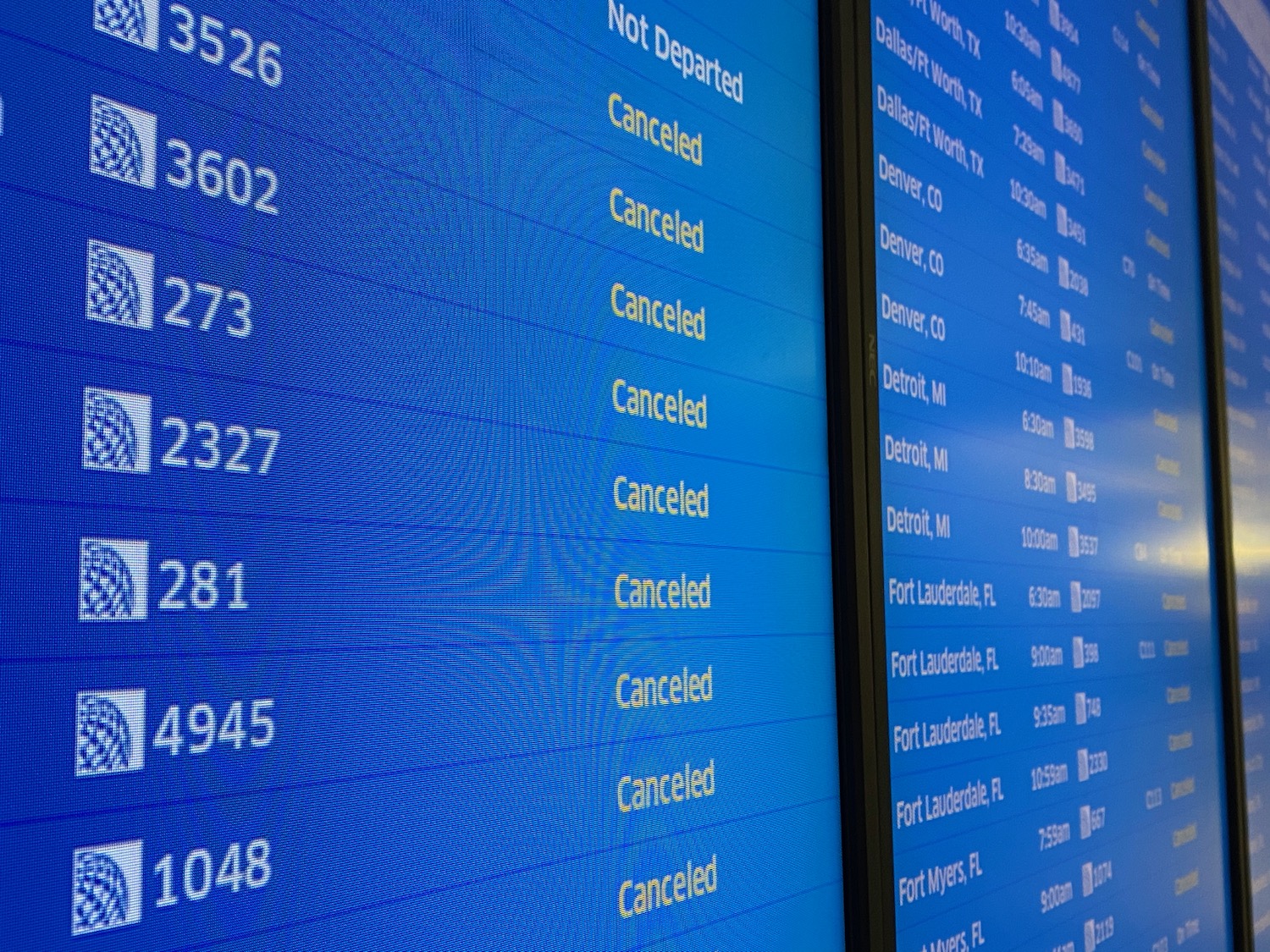
As a steep uptick in airline complaints persists compared to pre-pandemic levels, the U.S. Department of Transportation is considering new rules governing airline refunds.
New Regulations Under Consideration Concerning Airline Refunds In U.S.
During the early stages of the COVID-19 pandemic, many airlines either withheld refunds or dragged their feet, blaming cashflow concerns. In North America, Air Canada and United Airlines were the greatest offenders. In fact, the Department of Transportation proposed a $25 million fine against Air Canada for its refund practices (Air Canada ultimately settled for $4.5 million and has subsequently processed refunds).
But even today, airline complaints remain at elevated above historic annual levels and many of them center on refunds. With tremendous travel uncertainty present due to COVID-19 variants like delta and omicron, the Department of Transportation is considering whether to broaden refund rules, making it easier for consumers to obtain refunds, even when their flights are not cancelled or they buy highly-restricted tickets.
On December 2, 2021, the first meeting of the Aviation Consumer Protection Advisory Committee took place. It includes industry experts as well as industry insiders. The committee will continue to meet as the DOT considers whether to craft a new policy. Any change in the rules, which currently give airlines tremendous wiggle room in whether to offer refunds in case of flight cancellations and schedule changes, would not be retroactive and be presented for public comment before taking effect.
That meeting coincided with a release of a new report by the U.S. Public Interest Research Group (PIRG) concerning airline refunds. It details the difficulties travelers have had to endure to obtain refunds during the pandemic. It also condemns airlines for not paying reasonable expenses (such as for hotel rooms) when they cancel flights at the last minute.
But Airlines for America, present at the Advisory Committee meeting, pushed back. It noted that carriers have greatly loosened up refund policies and complaints are down significantly for the second half of 2021. Still, it argued that passengers who voluntarily buy non-refundable tickets and choose to voluntarily change their travel plans should not be entitled to a cash refund, regardless of their reason for doing so. The solution, it contends, is to buy pricier refundable tickets if more flexibility is desired.
Jacob van Cleef at PIRG argues that many passengers have neither the time or money to use credit and should not be held hostage by taxpayer-funded airlines due to policies and restrictions consumers have no say over.
My Take: Status Quo Works, Just Enforce It
Current regulations do require a refund for cancelled flights, but give airlines wiggle room in enacting “schedule changes” that may materially alter flight time (and in some cases, flight dates) but not technically be a cancellation.
I’m not convinced we need new rules rather than a stricter interpretation of current rules, which could require airlines to offer refunds if any change to the schedule is made.
But I’m impressed that U.S. airlines have largely eliminated change fees during the pandemic, which has greatly altered the way in which I buy tickets and been a huge win for customers.
I also am more sympathetic to the airline position that the mere declaration of a pandemic should not make all tickets refundable. Instead, a consumer can still weigh options, including whether to buy a pricer refundable ticket. One reason airline tickets are historically cheap in 2021 is because airlines choose to offer you the chance to lock in an inexpensive flight in exchange for making the ticket less flexible. That’s a bargained-for exchange and hardly represents coercion when so many other fare types are available.
Perhaps one change could be that refunds are required if travelers, though no fault of their own, are blocked from visiting a destination due to COVID-19 restrictions added after they booked their flight. In such cases, I do deem a refund appropriate and think a common standard could be helpful to adding certainty and stability to the U.S. aviation market.
CONCLUSION
Airlines acted horribly at the start of the pandemic, claiming they had no choice but to survive. Such action should never be allowed to be repeated. Steep fines against airlines that engage in such practice is appropriate. However, I’m not ready to side with a government fiat requiring all airline tickets to be refundable. That would mean higher-priced tickets for everyone, hurting the very people the policy intends to help.
What are your thoughts on mandatory refunds by U.S. airlines during the pandemic?




I agree with you that eliminating change fees was a huge plus, and gives tremendous flexibility in planning travel. Mandating cash refunds in situations where you knew (and tacitly accepted) the risk seems excessive.
I’m not rich, but I can at least afford to carry an unused airfare without losing sleep, so I guess I’m not too concerned about the policy except where it could have other implications. I sympathize with those in paycheck to paycheck situations, but airlines are businesses and can’t give on this without either raising prices or cutting back in other areas.
I think, like most goods, all “regular” (whatever that may mean) airfare purchases should always be fully refundable within a certain, reasonable period between purchase and departure, and I don’t mean a mere 24 hours. It would also be fine if airlines offered certain “special” non-refundable sale fares.
But one reason people don’t choose refundable fares now is that there’s such a significant jump in price from non-refundable to refundable. It’s only the illusion of choice for most flyers, and that stacks all the cards in the airlines’ favor, despite the fact that they frequently benefit from taxpayer bailouts.
Interesting – Over the past 2 years, I have made several bookings for our family with BA (>12), and have had to cancel / reschedule quite a few times. When I cancel, I always got my refund within 48 hours of cancellation.
I agree with your analysis Matthew. What is needed is a tightening of rules and most importantly enforcement. E.g. There should be no debate about 1. Refunds that were withheld improperly despite cancellation of flights (I was a victim of Air Canada’s cancellation shenanigans), 2. Refunds for flights that have “schedule changes” & 3. Refunds for destinations that are closed off due to the pandemic or any other reason.
At the same time, a pandemic should not be a blanket reason to convert all non-refundable tickets to refundable. The analysis should be based on the reason for the cancellation of the trip.
The DOT also needs to define what a significant schedule change is. That is open to interpretation right now.
Alaska Airlines did this to me early in the pandemic. Word for word I was told what you printed above, we have to keep your money so we can stay in business. So I have almost $1000 they have not refunded me tied up in their Wallet. I wrote to the Alaska Attorney General and was basically told tough luck. I had over $15,ooo refunded to me for our Alaska vacation. Alaska Airlines was the only company to keep my money so as I was told they could survive. I need that money to survive inflation but they don’t care. It was good to read this article and see that Alaska Airlines corporate policy inflicted on me may be an offense they will get fined for in the future.
In Canada by “proclamation” of our Canadian Transportation Agency (an alleged consumer protection agency) on March 13th 2020 it allowed all airlines to be free from ANY compensation for cancelled/delayed/or disrupted itineraries from any and all consequences related to responsibility. Also at that time stated cancelled travel by any airline only required a voucher for repayment. Avoid all airlines governed by CTA regulations if possible.